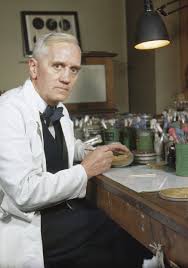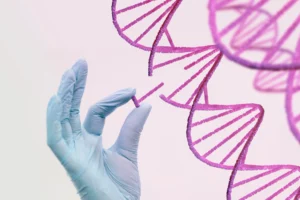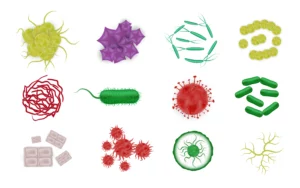
Early life and Education
Sir Alexander Fleming was a Scottish physician, microbiologist, and pharmacologist, who was born on August 6, 1881 at Lochfield farm near Darvel, in Ayrshire, Scotland. Alexander was the third of four children of farmer Hugh Fleming (1816–1888) from his second marriage to Grace Stirling Morton (1848–1928). In December 1915, Fleming married a trained nurse, Sarah Marion McElroy of Killala, County Mayo, Ireland. Their only child, Robert Fleming (1924–2015), became a general medical practitioner. After his first wife’s death in 1949, Fleming married Dr. Amalia Koutsouri-Vourekas, a Greek colleague at St. Mary’s, on 9th April 1953; she died in 1986. Fleming attended Loudoun Moor School, the Darvel School, and Kilmarnock Academy before moving to London, where he attended the Royal Polytechnic Institution. In 1903, Fleming enrolled at London’s St. Mary’s Hospital Medical School and graduated with distinction
He joined the research department at St. Mary’s, where he became assistant bacteriologist to Sir Almroth Wright, a pioneer in vaccine therapy and immunology. In 1908, he gained a BSc degree with Gold Medal in Bacteriology and became a lecturer at St. Mary’s until 1914. Fleming served throughout World War I as a captain in the Royal Army Medical Corps. He worked in battlefield hospitals at the Western Front in France. In 1918, he returned to St. Mary’s Hospital, where he was elected as Professor of school in 1928 and Emeritus Professor of Bacteriology of the University of London in 1948.
Contributions
Fleming demonstrated experimentally why antiseptics were killing more soldiers than infection during World War I. He established that antiseptic agents were only useful in treating superficial wounds but were harmful when applied to deep wounds. At St. Mary’s Hospital, Fleming tested the nasal secretions from a patient with a heavy cold. He found that nasal mucus had an inhibitory effect on bacterial growth. This was the first recorded discovery of lysozyme, an enzyme present in many secretions including tears, saliva, skin, hair and nails as well as mucus.
By 1927, Fleming had been investigating the properties of Staphylococcus. On 3rd September 1928, Fleming returned to his laboratory having spent August on holiday with his family. Before leaving, he had stacked all his cultures of Staphylococcus on a bench in a corner of his laboratory. On returning, Fleming noticed that one culture was contaminated with a fungus and that the colonies of Staphylococcus immediately surrounding the fungus had been destroyed, whereas other Staphylococci colonies farther away were normal. Fleming grew the mould in a pure culture and found that it produced a substance that killed a number of diseasecausing bacteria and called it ‘mould juice’. He identified the mould as being from the genus Penicillium and later named it penicillin. He investigated its positive anti-bacterial effect on many organisms and noticed that it affected bacteria such as Staphylococcus and many other Gram-positive pathogens that cause scarlet fever, pneumonia, meningitis and diphtheria, but not typhoid fever or paratyphoid fever, which is caused by Gram-negative bacteria. It also affected Neisseria gonorrhoeae, which causes gonorrhoea, although this bacterium is Gram-negative
Fleming’s accidental discovery of penicillin in September 1928 marked the start of modern antibiotics. Fleming also discovered very early that bacteria developed antibiotic resistance whenever too little penicillin was used or when it was used for too short a period. Fleming cautioned about the use of penicillin in his many speeches around the world.
Awards and Honours
- Fleming, Florey and Chain jointly received the Nobel Prize in Medicine in 1945.
- Fleming was knighted in 1944.
- In 1999, Time magazine named Fleming one of the 100 Most Important People of the 20th century.
- In 2000, three large Swedish magazines ranked penicillin as the most important discovery of the millennium.
- 91006 Fleming, an asteroid in the Asteroid Belt, is named after Fleming
Source: Alexander Fleming




Leave a Reply
You must be logged in to post a comment.